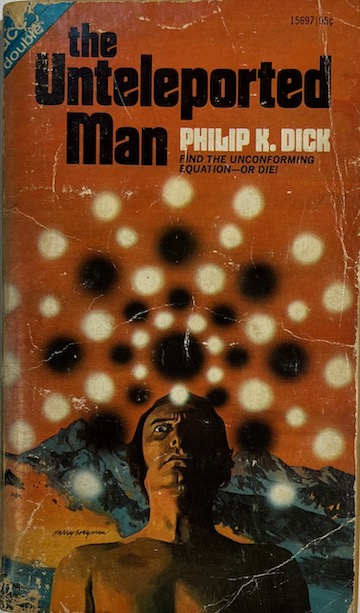Part 6 Philip K Dick 1971 Interview

James Holmes: What kind of snuff is that called, just out of curiosity.
Philip K. Dick: I’m glad you asked, because I get a commission on this. This is Dean Swift Snuff, the finest English snuff there is. This is a blend called Specific Number One. It’s really great stuff. It really spaces you out after a while, but it’s good, and it’s legal, but I digress. Eye in the Sky was really the beginning of my whole preoccupation with what is real and what is not real, because up to that point I thought I knew what was real and I just wrote it down and sent it off and some guy marketed it, some guy bought it, and some guy published it, and some guy read it, and the guy that read it, or the critic that read it, came around to me and explained, you know, that it was all in my mind, and about the time I wrote Eye in the Sky, I was beginning to become aware of the fact that what I thought was going on in the world around me was really going on in my own mind, and rather than give up, you know, and with solipsistic, you know, cop out, you know and say, “I can’t write about reality because I haven’t contacted it yet,” I said, “Well, where there’s a will, there’s a way,” as you know Polonius says to Hamlet. I’ll write about the fact that I don’t know what’s going on. I’ll write books in which people are in their own heads, and this was not in my eyes a great discovery; this was simply making the best of a bad situation. If I didn’t know what was objectively real, as had been pointed out to me, and I agree, at least I could write about what was subjectively real, and I decided that maybe every individual had his own subjective reality, and I didn’t invent that idea– I read that in a book somewhere. But, it just hit me, to write a book about six or eight people and for dramatic purposes have their subjective realities be different enough so that when you went from one to the next, the reader was aware of a tremendous jump, as much of a jump as I could think of, you know, like I deliberately posited a group of people with extremely different world views, so different that they weren’t philosophically different, they were structurally fundamentally different, and for those purposes, I had to create exaggerated world’s caricatures of normal world view differences, and, wow, I wrote it in two weeks, and I really enjoyed writing it, and to write a novel in two weeks from a physical standpoint is just almost impossible. I mean, you know, writing day and night and really being carried away and saying, “You know, gosh, wow,” and the dialogue just wrote itself. I mean, it’s really, really funny dialogue though, because it came out in England earlier this year and I read it over because I didn’t have anything else to read. It was sitting around in a box. I said, “What’s this,” and I says I’ll read it over, and oh, gosh, if I could write dialogue like that now– You know, like, the people said the kind of things, you know, that I wish I could think of to say, you know, in social situations. You know, like the guy’s wife says, “Well, I see you admiring that girl. I suppose you think she’s got a lot–” Well, see, I can’t do it. I’d have to get the book out. Damn it! And it went on like that for pages and pages, and I said all these wonderful brilliant things that I can’t think of, not one can I think of, and in two weeks I was finished and I sent it off, and I got a little tiny amount of money for it as usual, you know, which that’s the breaks. A thousand dollars is what I got for it, and–
Philip K Dick: All I have ever made on it, was $1750 bucks. In all its printings, which is Mickey Mouse money really. John Christopher wrote a novel at the same time as mine and he got a hundred thousand bucks for his and mine was listed as one of the fifty best novels of the decade. But still, I only got $1750 bucks.
James Holmes: [laughs]
Philip K. Dick: It was a very fine book. I don’t care how much money I made because I am still alive. You know, I got enough to eat and everything like that. When I read it over I said to myself, “Now this is really a good book.” This was the first thing I wrote that was… Maybe the only thing I wrote that really inspiring. You know, to write it in two weeks, to have it be a very original let us just say and especially from my historical stand point at that time. A really revolutionary thing in the field. For instance, was it a fantasy or science fiction? At that point, nobody could decide.
James Holmes: It is fantasy.
Philip K. Dick: A science fiction. It was neither one. It was something new, you know. It was reality so it wasn’t fantasy. With science but it wasn’t what set in the present now. It was set in 1954, I believe or 56 and that was not set in the future. It was set in Belmont. Not set you know on, Jupiter. Everybody drank at this particular bar if you remember, you know. I mean, it was a really a trick novel. It was really a… Oh man, I really love that book. Wish I could write like that now. That started me on an interior point of view thing. That got stronger and stronger. The subjectivity got greater. In trying to establish the only reality that I know which was a subjective reality I pushed further and further into more extraordinary subjective states and subjective worldly views. Now the introduction of pathological or psychotic world views in my stuff which really dates from Eye in the Sky. If you remember Miss Reiss, Miss Reiss’s part… She was nuts. That was one of my deliberate selections. I selected a fundamentalist religious…. Did you read?
I had selected a fundamentalist religious type, a communist. I forget. A bourgeoisie woman who would could not believe sex had to be around and various of other, you know. Extravagant forms. I deliberately selected a psychotic world view for one of the episodes. I didn’t enjoy writing that part. I didn’t enjoy being in a psychotic world and writing from a psychotic standpoint. But later on, I realized that this was perhaps the most extreme world view that there was. In a way, that was the definition of psychosis. It is the extraordinary drop away from shared reality and conventional experiences in such a way that communication breaks down. For the kind of exploration that I was making, the kind of point that I was making that was to push further and further into what is real. I would have to go more and more into psychosis because psychosis by definition was a more extreme kind of divergence from the ordinary or shared world of view.
James Holmes: Uh-hmm.
Philip K. Dick: I was not really…
James Holmes: [coughs]
Philip K. Dick: …I think, involuntarily expressing my own psychological problems. Because when I would write one of these things with the one exception of the Three Stigmata of Palmer Eldritch, I was not caught up at all in any of the psychological processes involved in the world. Like for instance, The Game Players of Titan.
James Holmes: Uh-huh.
Philip K. Dick: Did you read that?
James Holmes: Uh-huh.
Philip K. Dick: Well now, a lot of critical material written on that studied in detail the paranoid aspects of it. The conviction you know, that was expressed over and over again in the book that the people who are wandering around in the book were not really human but were alien monsters assuming human form. Well, you know like…

James Holmes: [coughs]
Philip K. Dick: …I did this deliberately. This was not something that I really suspected was true in reality. You know, that anybody around me was an alien monster. I never, for a moment was in any way personally preoccupied with this, believed in it in any kind of theoretical way or experienced it in any kind of psychological way. This was a device that I deliberately adopted. I actually copied it out of another story. I mean, I plagiarized the idea. I had read it, I forget who wrote it. I was intrigued by it and I saw it as a way of achieving that kind of point I was trying to achieve. The sole exception was the Three Stigmata of Palmer Eldritch which was not that kind of story in any way. It was a study of absolute evil and not a paranoid thing at all. But the thing that I was preoccupied with was reality versus illusion. The device that I used was the simulacrum which is what…
James Holmes: Uh-huh.
Philip K. Dick: …I like to call it. That is what appears to be a human being but when we get closer to it or we see it long enough or if something happens, we discovered it is not a human being but is either an artificial construct or something from outer space. You see, the fact that I don’t even care whether it is something from outer space, that it’s organic and alive or a laboratory product which is sold as an analgesic show that this is not a psychological preoccupation. If it was, the distinction between those two would be of great importance to me. All that’s important to me is the fact that it appears to be conventional. This is the element that is constant in this artifice. It is simply… It appears conventionally. It could be a chair. I mean, I could have simplified it and they all said, “Well, look at all the human beings, they all look like chairs.” Gosh! So this is my chair let us buy it. A chair that easily displays wings and flies it off, you know. I could have done that but how many books can you write. How many things can chairs say, you know and do. I have never met a human being that I thought was a simulacrum or I have never met a simulacrum that I thought was a human being.
James Holmes: [laughs]
Philip K. Dick: This was never a symbol of anything. This was never a philosophical preoccupation and stuff. It was only a technique, a dramatic technique for handling what was the preoccupation. Reality versus illusion. A very simple idea in there. The illusion is the human appearance. The reality is questionable. What lies behind it. That was a question. I was not giving an answer. I was as happy to say that a machine lay behind it as to say an extraterrestrial life form.
Phillip K. Dick: Now, in one story that I wrote called “Human Is”
Continued in:
Part 7 Philip K Dick 1971 Interview

